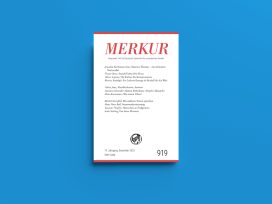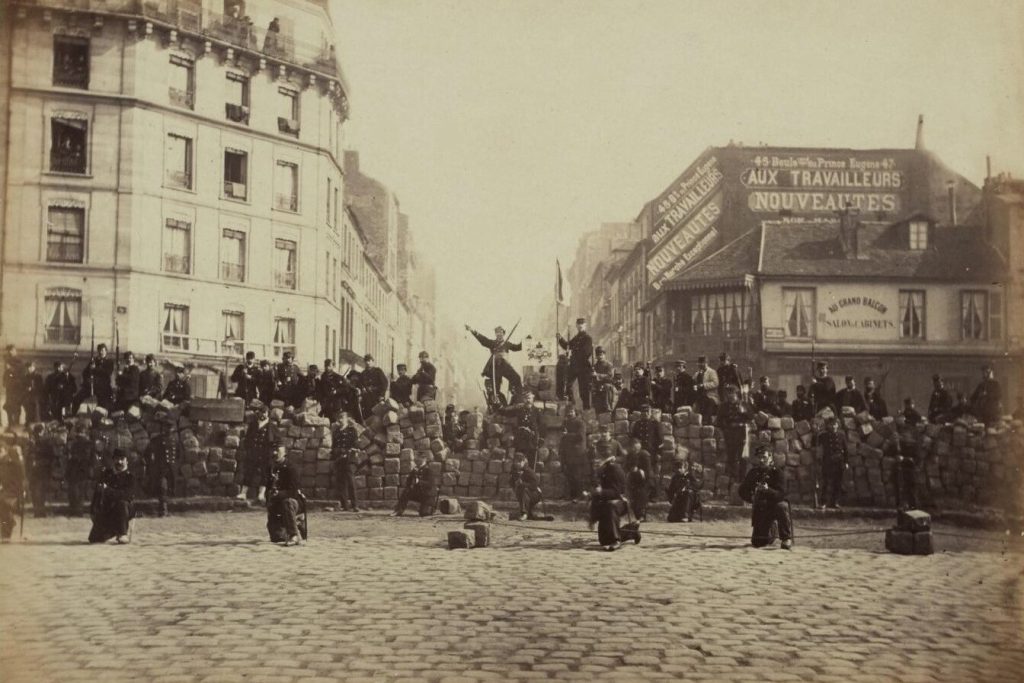
Cosmic Europe
Merkur 12/2025
Leibniz’s Europe; why majority rule is relative; social chromatics off the scale; travels in post-capitalism.
Debate around the cultural sector’s structural inequality often ignores issues of class. Yet behind the success of many practising artists lies an inheritance, allowance or other class privilege. Eight portraits of Belgian artists seek literary revenge, breaking into cultural capital’s invisible economy.
All people are intellectuals
but not everyone in society is given
the role of intellectual
Antonio Gramsci 1

Chaussée Ménilmontant barricade, Paris Commune, 18 March 1871. Image via Wikimedia Commons
J.L. is a poet and lives in a house owned by his mother. He pays a symbolic €100 every month as rent. At sixteen, J.L. was sent to work for a month in a canning factory near the village where he grew up. This Flemish, middle-class ritual serves two goals: creating the illusion of class understanding and ensuring good grades. J.L.’s book collection, comprising thirty metres of spine, was burnt in his living room.
Each month, I.N. receives €1,800 from her mother. She is an only child, receiving her inheritance in advance. Besides being a nest egg (her mother’s words), the monthly transfer is also a form of financial pragmatism: it helps the family circumvent the Flemish nine-percent inheritance tax. At twenty-eight, I.N. is still a student. Soon she will obtain her third master’s degree. We graffitied ‘meritocracy is a lie’ on the mother’s villa.
Visual artist B.R. is the son of a heart surgeon. Watching her colleagues’ children grow up into insufferable brats, the surgeon understood that loving a child also means shielding it from the toxicity of middle-class privileges. When B.R. misbehaved as a teenager, he had to bear the financial consequences himself. His mother never gifted him an expensive, ostentatious car. Yet B.R. never worked to pay for his studies. He does not know the sound of a declined bank card nor the hunger that follows. B.R. believes that, unlike his friends, he grew up in normal circumstances. He doesn’t see how privilege hides itself from the body within the body. We learn here that a pig only recognizes itself by its mud.
Artist M.L. is the daughter of two lawyers. At eighteen, she was gifted an apartment in Amsterdam’s historic Canal District. Since completing her second master’s degree, she has been renting out her apartment for just under €2,000 per month – an amount she pays herself monthly as compensation for her intellectual work. She leads a nomadic existence and travels from one artist residency to another. It barely matters whether the residency is in Estonia, Portugal or Romania; she could have encountered the same people in France, Sweden or Slovakia. These transnational spaces are sanctuaries where creativity doesn’t need to justify itself, where thinking is unbound by obligation and responsibility. Shall we call these spaces the intellectual Cayman Islands and M.L. a community tax evader? We shall call them so.
Writer and columnist J.V. has never had a regular job. Like most of her peers, she is aware of her privileged position and feels obliged to give something back to society. When a leading newspaper asked her to write a bi-weekly column, she seized the opportunity with both hands. J.V. fights for the socioeconomically oppressed woman in all her guises: the underpaid cleaner, the imported bride in the nail salon, the undocumented sex worker. Is her decision to write columns authentic or hypocritical? Does she legitimize her privilege on the backs of vulnerable women or transform it into a platform for meaningful solidarity? The answer is that all these statements are simultaneously true. It is also true that we have smashed the windows of her car.
Celebrated writer E.V. grew up as the eldest daughter of a single mother. Journalists often ask her about the hardships of her youth and the nightwork in an industrial laundry that financed her studies. When she couldn’t find a job after graduating, she sank into illness, shame and depression. In her work, E.V. rewrites her life story into a product that can be consumed by the middle class.We are not immune to jealousy and petty behavior. We have carved CLASS TRAITOR into her front door.
Artist and activist S.V. became a father at thirty. That year, his parents gifted him and his girlfriend a townhouse valued at approximately €800,000. Because S.V. doesn’t consider himself capable of working for someone and doesn’t want to sell the house while his parents are still alive, his everyday existence is precarious by most standards. This justifies his aggressive competition for artistic project subsidies. His virtually unlimited free time allows S.V. to maintain an extensive network within the artistic world, which usually helps him secure the subsidies. In September, when the family spent three weeks in Malaysia for a friends’ wedding, we pushed a nest of rats through their mailbox.
K.L. was born into a millionaire’s family and lives in a spacious apartment in Berlin. He has written a short book admiring the 1871 Paris Commune, which was praised in leftist publications for its historically substantiated reconstruction of the barricade fights and convincing evocation of proletarian rage. We burned down the L. family’s houses, as well as the offices of their lawyers and insurers. Afterward, we returned to burn down the rubble too.
This article was first published by rekto:verso. Its translation from Flemish Dutch into English was commissioned as part of Come Together, a project leveraging existing wisdom from community media organization in six different countries to foster innovative approaches.

A. Gramsci, Prison Notebooks of Antonio Gramsci, 1929-35 (trans. Arthur Weststeijn, Alle mensen zijn intellectuelen, 2019).
Published 17 June 2025
Original in Dutch
Translated by
Mathijs Tratsaert
First published by rekto:verso (Flemish original); Eurozine (English version)
Contributed by rekto:verso © Mathijs Tratsaert / rekto:verso / Eurozine
PDF/PRINTSubscribe to know what’s worth thinking about.

Leibniz’s Europe; why majority rule is relative; social chromatics off the scale; travels in post-capitalism.

Throughout history, Belarusians have turned to their rich folklore traditions in harsh times. What may appear as a period of cultural stagnation is often a moment of resilience and creative revival. And the current wave of Belarusian folk texts, music and dance is no exception.